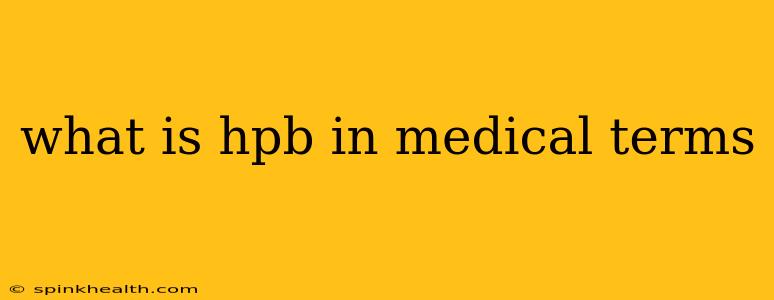What is HPB in Medical Terms? Unraveling the Mystery of Hepatobiliary Pancreatic Disorders
The abbreviation HPB in the medical world stands for Hepatobiliary Pancreatic. It refers to a specialized field of medicine focusing on the liver (hepato-), bile ducts (biliary-), and pancreas (pancreatic-). These three organs work together in a complex system responsible for vital bodily functions, including digestion, nutrient absorption, and detoxification. Think of them as a finely tuned orchestra, and when one instrument is out of tune, the whole performance suffers. That's where HPB specialists come in.
Let's delve deeper into this intricate system and explore some common questions surrounding HPB.
What organs are included in the hepatobiliary pancreatic system?
The hepatobiliary pancreatic system encompasses three major organs:
- The Liver: This powerhouse acts as the body's central processing unit, filtering toxins from the blood, producing bile (essential for fat digestion), and storing glucose.
- The Biliary Tract: This network of ducts includes the common bile duct, cystic duct, and gallbladder. They transport bile produced by the liver to the small intestine. The gallbladder acts as a storage reservoir for bile.
- The Pancreas: This organ plays a dual role, producing digestive enzymes that break down food and hormones like insulin, which regulate blood sugar levels.
Disruptions in any of these organs can have significant and cascading effects on the entire system.
What are some common HPB diseases?
A wide array of diseases can affect the hepatobiliary pancreatic system, ranging from relatively benign conditions to life-threatening ones. Some common examples include:
- Gallstones: These hard deposits form in the gallbladder and can block bile ducts, causing pain, inflammation, and jaundice.
- Pancreatitis: This inflammatory condition can be acute (sudden onset) or chronic (long-lasting), often caused by gallstones, alcohol abuse, or certain medications.
- Liver cirrhosis: This is a late stage of scarring (fibrosis) of the liver caused by many factors including alcohol abuse, viral hepatitis, and nonalcoholic fatty liver disease.
- Liver cancer: Several types of cancer can affect the liver, and they often have a poor prognosis if not detected and treated promptly.
- Pancreatic cancer: This is notoriously difficult to detect early and has a high mortality rate.
- Biliary tract cancer: This encompasses cancers of the bile ducts, gallbladder, and ampulla of Vater (where the bile and pancreatic ducts meet).
- Hepatitis: Viral infections that inflame the liver, causing a range of symptoms from mild discomfort to liver failure.
What are the symptoms of HPB disorders?
Symptoms of HPB disorders can vary greatly depending on the specific condition and its severity. However, some common signs include:
- Jaundice (yellowing of the skin and eyes): This often indicates a blockage in the bile ducts.
- Abdominal pain: This can range from mild discomfort to severe, agonizing pain.
- Nausea and vomiting: These are common digestive symptoms.
- Changes in bowel movements (pale, clay-colored stools): This is a sign that bile is not reaching the intestines.
- Dark urine: Another indicator of impaired bile flow.
- Weight loss: Often associated with chronic HPB disorders.
- Fatigue: A general feeling of tiredness and weakness.
What specialists treat HPB disorders?
HPB disorders are typically treated by specialists called gastroenterologists or HPB surgeons. Gastroenterologists focus on the digestive system and are often the first point of contact for suspected HPB problems. HPB surgeons are specialized surgeons who perform complex procedures on the liver, bile ducts, and pancreas. They frequently work in close collaboration with gastroenterologists and other specialists, including oncologists (cancer specialists) and radiologists.
This overview provides a general understanding of the hepatobiliary pancreatic system and its associated diseases. It is crucial to remember that this information should not be considered medical advice. If you suspect you have an HPB disorder, it is essential to consult with a healthcare professional for proper diagnosis and treatment. Early intervention is key to managing HPB conditions effectively and improving patient outcomes.

